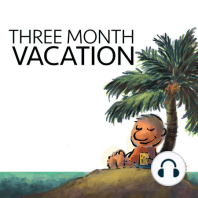21 min listen

How To Avoid Overwhelm (And Systematically Complete Projects)
How To Avoid Overwhelm (And Systematically Complete Projects)
ratings:
Length:
34 minutes
Released:
Sep 16, 2017
Format:
Podcast episode
Description
Whenever you have a deadline, somehow you're able to stagger towards it and get the job done. But other tasks never seem to move forward. You fall behind on your reading, your fun projects, even that movie you'd promised yourself. In life we need to complete projects that are urgent, but also projects that are good for the soul. How do we get these projects going and how can we sustain them over the long term? Let's find out in this episode. Click here to read it on the website: How To Avoid Overwhelm (And Systematically Complete Projects) -------------------- I remember lying in bed on a Sunday morning and realising I was a hypocrite. My niece Marsha says she loves reading, which is why we bought her the entire Harry Potter, the Percy Jackson and the Kane Chronicles. She stuttered through the Harry Potter series but made her way to the last book. And as of this moment, she's been stalled on the first book in the Percy Jackson series. When I ask her if she's been reading, she always nods happily, but she's barely progressed further than 10-15 pages in the last month or two. It bugs me, because I know that reading isn't just about reading. It's about spelling, structure, storytelling and imagination. As you'd expect, I'd nudge Marsha at every chance I got, encouraging her to read, but she still gives me a happy smile and makes little or no progress. Until that Sunday morning, I didn't think the lesson of the nudge applied to me I'm one of those crazy people. I go for a walk, and sometimes I'll listen to music, or Renuka and I will talk all the way. Even so, I'll get at least between an hour to two hours of audio every week. I'll read before I go to bed, and sometimes on weekends. I'll even spend Friday morning planning and then get an hour's worth of reading. I'll even watch a TED Talk on while making breakfast every day. Marsha's situation doesn't apply to me, so why did I feel like a hypocrite? It just so happened that I was browsing through my Kindle collection that Sunday morning As I scrolled through the books, I realised I hadn't read at least 30% of what I'd bought. That among those I'd read, there were several that were half-abandoned. A good chunk was complete, but how's that different from Marsha? How's that different from all of us? We start out with good intentions. We buy stuff; we save stuff onto our computers or devices for future reading and then suddenly it seems to be too overwhelming. We're reading through one book when you get a recommendation to read five others. You're leafing through one article, and a stack of one thousand seem to be trying to be trying to get through the front door. I don't like the feeling of being a hypocrite, so I devised a system. And since I like naming systems, I called it “TBM”: the bare minimum. It even sounded nice when written on a piece of paper. Or better still on a car plate. In my crazy mind, I read it as “T BM”. As in the “the bum”. The kind of guy who is lazy and won't do much more than needed to get by. This mindset of doing the bare minimum was my own invention, it seems. And yet it's not. Many years ago I'd read about the financial advisor, Dave Ramsey who talked about his own bare minimum method when paying back loans. When you have several loans to pay back what advice do financial planners give you? They tell you to pay the biggest loan first. Which means if you have loans of $500, $2000, $200,000, it makes a lot of sense to whittle down the biggest loan, as it also has the largest portion of interest. Ramsey works on a seemingly counter-intuitive method. He gets you to pay the smallest loan first. Here ‘s How the Debt Snowball Method Works As he explains on his website, it's a bit like a snowball, a debt snowball. The debt snowball method is a debt reduction strategy where you pay off debts in order of smallest to largest, gaining momentum as each balance is paid off. If the task is too big, it's easy to give up. After all, a $100 payment is barely going to tickle
Released:
Sep 16, 2017
Format:
Podcast episode
Titles in the series (100)
Why We Sell Less: The Root of Confidence: The hardest thing in business?or life is the factor of confidence. Whether you're in online marketing, selling products or services, or run a physical store, the confidence goes up and down. And yet, confidence is what creates sales. Sales, after all,... by The Three Month Vacation Podcast